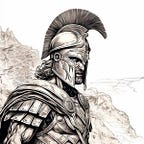Incitatus: Caligula’s Legendary Horse
When delving into the eccentricities of Roman emperors, Gaius Caligula stands out as one of the most infamous. Among his many eccentric acts, one story captures the imagination more than others: Caligula’s treatment of his favorite horse, Incitatus. This article will explore the tales surrounding Incitatus, their historical context, and what they reveal about the controversial emperor.
Who was Caligula?
Gaius Julius Caesar Augustus Germanicus, commonly known as Caligula, ruled the Roman Empire from 37 to 41 AD. His short reign was marked by bouts of excessive spending, erratic decisions, and purported insanity. Stories of his cruelty, despotism, and debauchery are legion. Yet, it’s essential to approach these tales with caution, as many are potentially exaggerations or fabrications from his enemies.
The Legend of Incitatus
Among the tales of Caligula’s odd behavior, his relationship with Incitatus is often cited as a prime example of his alleged madness. Incitatus wasn’t just any horse; he was treated with extraordinary luxuries. Historical accounts, especially from writers like Suetonius, detail some of these indulgences:
- Luxurious Stable: Incitatus lived in a marble stable with an ivory manger. Such opulence for a horse was unheard of and showcased Caligula’s seemingly unbridled extravagance.
2. Household Servants: The horse reportedly had a retinue of servants, and some accounts even suggest he had slaves to attend to him.
3. Formal Invitations: Incitatus was said to be invited to dine with the emperor, and on some occasions, he was a guest of honor at banquets.
4. Possible Consulship: Perhaps the most famous tale is that Caligula intended to make Incitatus a consul, the highest elected office of the Roman Republic and a significant position in the empire. This act, if true, would have been a clear insult to the Roman Senate and aristocracy, signaling that a horse could do as good a job as any of them.
Historical Accuracy and Interpretation
While these stories are fascinating, it’s crucial to approach them critically. Much of what we know about Caligula comes from sources written years after his death, often by authors with clear biases against him. Suetonius, a chief source of Caligulan lore, wrote nearly 80 years after the emperor’s death.
So why the extraordinary tales? Some historians suggest that the stories surrounding Incitatus were symbolic, representing Caligula’s disdain for the Roman Senate and aristocracy. By heaping privileges upon a horse, Caligula may have been mocking the political establishment, demonstrating that even an animal could be as worthy (or more) than the leading men of Rome.
Others theorize that these stories are pure fabrications or exaggerations, intending to portray Caligula as mad and unfit for the throne. The legend of Incitatus might have served as a vivid example of the emperor’s alleged insanity, driving home the idea that he was a danger to the empire.
Conclusion
While the truth about Incitatus may never be entirely clear, the tales surrounding him offer a fascinating glimpse into the turbulent era of Caligula’s reign. Whether as a genuine symbol of Caligula’s disdain for the Roman elite or as a fabricated tale of madness, Incitatus remains an enduring symbol of an emperor’s notorious eccentricity.
- Legion Lore
- Further Reading
- Suetonius. The Lives of the Twelve Caesars. Translated by J.C. Rolfe. Harvard University Press, 1913.
